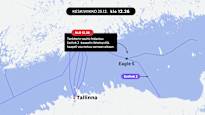The Eagle S tanker ran over several damaged telecommunication cables. The tanker is suspected of belonging to Russia’s so-called shadow fleet.
Riku Roslund
Ilkka Kemppinen
Toni Joukanen
Päivi Koskinen
The Eagle S tanker ran over several undersea communication cables around the same time that the companies operating the cables discovered that they were damaged.
The tanker sailed over the data cables on Wednesday evening between six and seven, according to the MarineTraffic service, which monitors ship traffic.
Two of the damaged cables belong to the telecom operator Elisa.
Elisa also tells that the company noticed the damage at exactly the same time.
Elisa’s security director Jaakko Wallenius according to the company noticed the violations because its system alerted the matter immediately.
According to the Submarine Cable Map website, Elisa has three data cables running from Espoo and Helsinki to Tallinn. Wallenius does not tell the names of the broken cables.
During the Christmas holidays, the authorities also reported about disturbances in two other data cables in addition to Elisa’s cables.
Other damaged cables are the Finnish Cinia’s C-Lion1 cable running from Helsinki to Germany and the Chinese-owned CITIC Telecom’s cable running from Helsinki to Tallinn.
The damage happened just a few hours after the Estlink 2 power cable between Finland and Estonia suffered damage.
The Finnish police suspect the Eagle S vessel of cable damage. The police are investigating the events as aggravated vandalism.
Researcher: Finland may have prevented even more acts of destruction
An expert working at the Maritime Law Research Center in Norway considers it possible that the tanker could have continued with the suspected cable breaks if Finland had not stopped it.
– If the ship had been allowed to continue its journey even further, the Estlink 1 cable between Finland and Estonia, which is close to the now broken C-Lion1 cable, would also have been in danger. And from then on, the Balticconnector gas pipeline and many other undersea cables would have been next, the researcher estimates Alexander Lott To .
Lott specializes in international maritime law.
He considers Finland’s action in stopping the ship to be a precedent from the point of view of maritime law.
